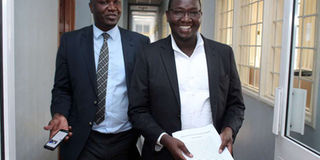Why court reversed Justice George Odunga's decision on IEBC officers

Lawyers Willis Otieno and Evans Oruenji at the High Court on October 25, 2017 after Justice George Odunga ruled that the process of appointing IEBC returning officers and their deputies was unlawful. The Court of Appeal suspended the ruling on the same day. PHOTO | DENNIS ONSONGO | NATION MEDIA GROUP
What you need to know:
- The Court of Appeal said the election had to be held within 60 days as declared by the Supreme Court.
- Altering the date could plunge the country into a constitutional crisis leading to anarchy, the judges said.
The Court of Appeal on Wednesday evening suspended a judgment that found the appointment of retuning officers and their deputies was illegal, to avert a constitutional crisis.
The three judges who lifted Justice George Odunga’s judgment reasoned that the decision had the potential of rendering the repeat presidential election irregular even before they were held thus “precipitating another election outside 60 days in contravention of the provisions of Article 140(3) of the Constitution”.
SUSPENDED
The Court of Appeal judges faulted Mr Odunga’s decision, saying that in their view the Constitution does not expressly give the courts the power to alter the election date.
“Thus, a decision of the court regarding the holding of a fresh presidential election had to be in conformity with Article 140(3) of the Constitution. The sixty days stipulated under Article 140(3) is sacrosanct and a decision having the effect of altering the stipulated date would not only be unconstitutional and thus invalid, but it is likely to plunge the country into a constitutional crisis leading to anarchy,” the Court of Appeal judges said.
According to Justices Erastus Githinji, Martha Koome and Fatuma Sichale, they had to suspend the High Court decision considering the complexity and enormity of the matter under consideration.
The Independent Electoral and Boundaries Commission (IEBC) rushed to court soon after Justice Odunga made the ruling, arguing that it might interfere with Thursday’s repeat election.
RULING
Justice Odunga had ruled that the appointment of returning officers and their deputies was illegal. However, the Judge refused to quash the gazette notice containing the names of the constituency retuning officers and the deputies, which would have meant that they would have not presided over the fresh election.
He also said there was no application seeking an order for either cancellation or postponement of the election.
“For the said election to proceed in the absence of the said officers would in my view constitute a crisis of unimaginable magnitude. Simply put, it would be a recipe for chaos,” the judge stated.
TRANSFERRED
The case was filed Mr Khelef Khalifa and Mr Hassan Abdi Abdille, who argued that IEBC made the appointments without following the laid down procedure of the law, ignoring the need for transparency and accountability in the process and violated the provisions of Regulation 3 of the Elections (General) Regulations, 2012.
They argued that IEBC did not provide a list of the returning officers to political parties at least 14 days before the appointments were made.
The electoral commission had defended the appointments, saying that the CROs and DCROs are permanent employees and were appointed and participated in the August 8 General Election.
The commission argued that there has been no change in the employment status of the officials, except that some of them were moved from their initial constituencies.
Further, the commission argued that the Supreme Court did not, in its judgment, annul the entire electoral cycle that had been undertaken, which includes the appointment of the CROs and DCROs.
MINIMUM STANDARDS
The IEBC further said that given the circumstances, it was not possible to provide the list before the appointments due to the limited time it had.
Justice Odunga had ruled that all the processes leading to the election are subject to scrutiny and might be grounds for nullification of the election.
“To avoid such an eventuality, the preparations leading to the election must meet the minimum standards articulated in both the Constitution and the law,” he said.





